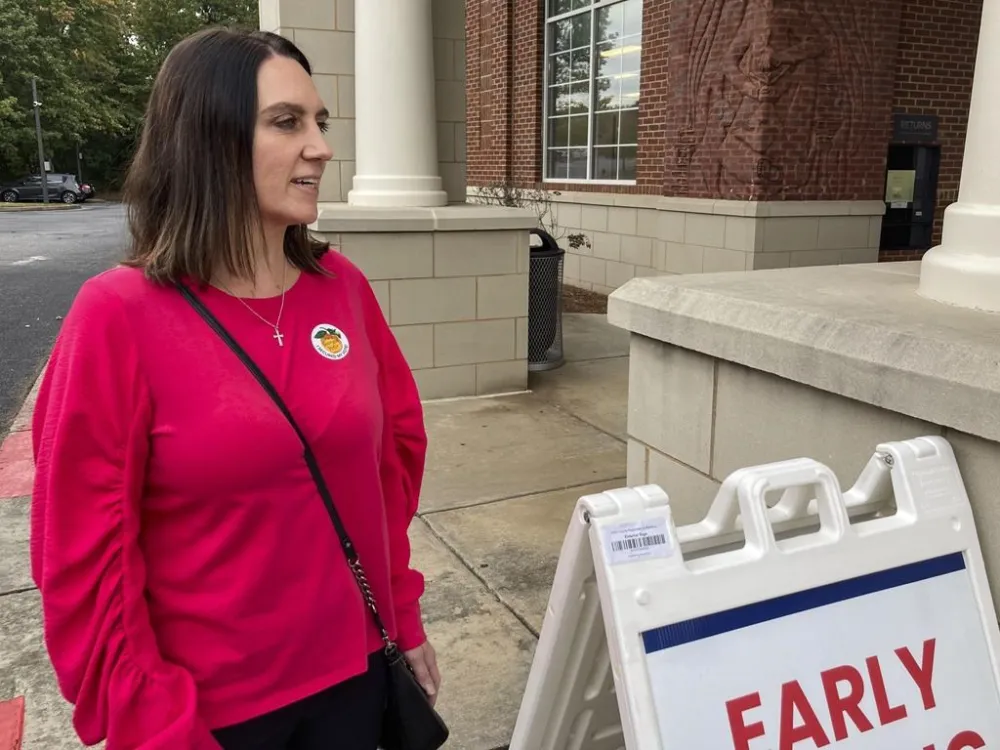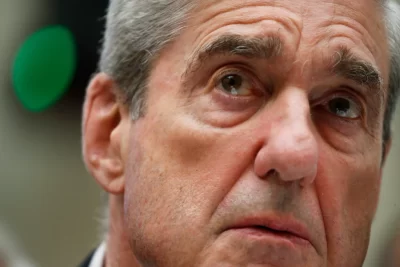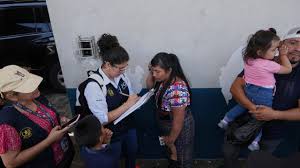
As she accepted an endorsement from a group called Veterans for Trump, Stacy Skinner spoke about how she got into politics because Democrats “were starting to infiltrate on the local level.”
Former President Donald Trump and other national Republicans often warn of takeovers by China or people crossing the U.S.-Mexico border. Skinner is running for reelection to the City Council of Johns Creek, an Atlanta suburb of about 85,000.
Yet the 44-year-old does not openly promote her Trump association, telling inquisitive voters in this Republican-leaning enclave only that she is “conservative.” Skinner’s opponent, Devon Dabney, meanwhile, faces questions about being a Democrat.
Going into the 2024 presidential election, the dynamics in Johns Creek and other nearby Atlanta suburbs reflect how partisan and cultural divisions that intensified since Trump’s 2016 run have trickled down to local campaigns. Some activists and voters now view these nominally nonpartisan contests as critical fronts in shaping the nation’s identity.
“People have a right to know who they’re voting for,” said Betsy Kramer, a Republican Party volunteer who is backing Skinner in Johns Creek, which is about 30 miles north of downtown Atlanta in Fulton County. “I’m not voting for a Democrat,” Kramer said. “I’m concerned that if Democrats start taking over north Fulton, the whole area is going to change dramatically.”
This swath of the metro area has become more demographically and politically diverse over recent decades, with growth among Asian American, Black and Hispanic populations that help boost Democrats’ vote totals. The share of Georgia residents who identify as white and non-Hispanic fell in the most recent census to 50.1%, the lowest on record.
Additionally, some Republicans who still make up north Fulton County’s electoral majority have never marched in lockstep with Trump and the tea party, a movement that opposes the Washington political establishment and espouses conservative and libertarian philosophy. In 2020, Trump underperformed historical Republican advantages in the area on his way to losing Georgia by fewer than 12,000 votes out of 5 million cast. And the region once elected Brad Raffensperger, Georgia’s secretary of state who bucked Trump’s efforts to overturn his defeat, to the state Senate.
Raffensperger and Gov. Brian Kemp drew strong support here in their comfortable reelection victories last year despite furious criticism from Trump for not going along with his bid to overturn the election. Trump’s efforts are now the focus of a racketeering indictment in Fulton County.
The national undercurrents do not mean that the usual list of hot topics at city halls has changed. It’s still mostly zoning and other development rules; sales tax and property millage rates; and how best to deliver services like public safety, fire protection and garbage collection. But candidates and voters talk about old, familiar debates in a different way as partisan influences rise.
“We are seeing this nationalization everywhere, especially in school board elections but also extending to cities,” said Michigan State University professor Sarah Reckhow, who tracks American campaign trends.
Reckhow pointed to several variables: the gutting of local journalism that means voters hear mostly about national politics; voter demands revolving more around cultural hot buttons rather than traditional local policy; and low voter turnout that increases the power of the most engaged and partisan citizens.
“This creates a cycle,” she said, where voter preferences, media narratives and politicians’ rhetoric become “kind of reinforcing.”
The new landscape may help explain why Skinner is circumspect about Trump and how she and Dabney are carefully navigating their partisan preferences.
“President Trump is obviously divisive,” said Skinner in a interview, insisting the endorsement “was about the veterans” rather than Trump himself. “Everything has gotten more divisive than I think it needs to be.”
Dabney, a Black woman, nonetheless sees herself as a target. She bemoans what she says is a “whisper campaign” that casts her as a threat to Johns Creek’s identity because of her voting history.
She acknowledged getting door-knocking and other help from grassroots progressive groups in Johns Creek and Democratic activists from elsewhere but said that came only after she was being attacked by Republicans.
“My parents were involved in the Civil Rights Movement,” she said. “It’s no secret that most Black people have voted for Democrats since then.”
But “this is a nonpartisan election,” she said. “It shouldn’t matter.”
The new intensity is especially obvious in discussions over development, conversations that usually revolve around “high-density” construction of apartments and condominiums.
Zoning has long been contentious in U.S. suburbs, which blossomed after World War II and through the Civil Rights Movement as places for middle-class and upper middle-class whites to establish self-contained communities set between the economic challenges of rural America and the racial and ethnic diversity of large cities, including Atlanta.
Now, those zoning issues are a flashpoint in partisan politics. They are reflected in national rhetoric like Trump’s call to build a wall on the U.S.-Mexico border, arguments over “sanctuary cities” run by liberals and tighter federal restrictions on legal immigration.







